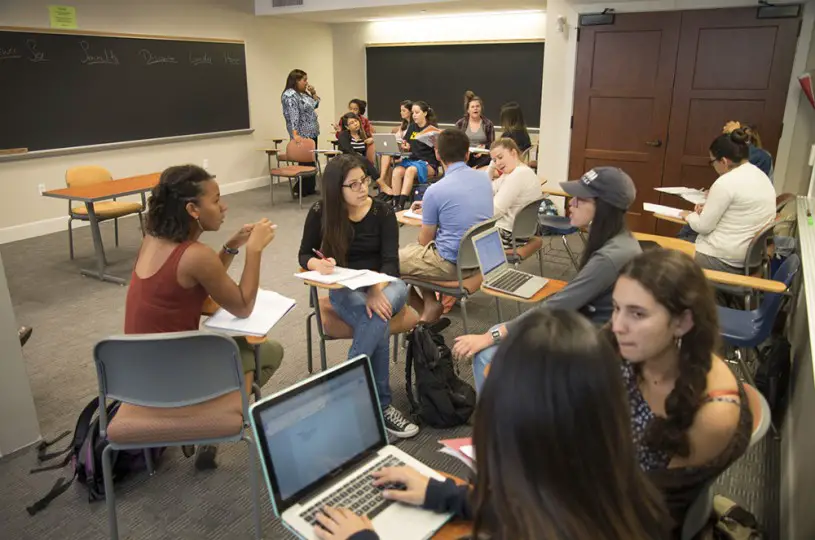Rethinking College History
If the point of required classes is to produce useful citizens, then students should be learning about recent history.
By Alli Guaman, Marymount Manhattan College
From elementary to high school, history is a core class in student curriculum, but in college, it becomes more of a required elective.
And, because textbooks are in constant need of an update, the information taught in history classes is often archaic. Not to mention, with the same resources being used over and over, students tend to think of history as an analysis of world events from approximately a hundred years back or earlier.
Unfortunately, the single required history elective doesn’t do much to combat this stereotype. The emerging generation of millennials fails to recognize history as essential knowledge that plays a significant role in a person’s understanding of their surroundings. Depending on which history class a college student decides to take (if they are not majoring in a history-related field) as a required elective, it’s likely that it will cover facts that the student already knows.
But, what about recent events?
Why is the Ukraine at war with Russia? Was Guadalupe Garcia de Rayos deported from her home in Arizona as a direct result of President Trump’s policy of deporting undocumented immigrants, or did it begin with a policy implemented by former President Barrack Obama? Who was secretary of state while former President Bush was in office? What is the root cause of the war with Syria?
Why does all this matter?

Well, when a student graduates from college, they’ll be more prepared to face the realities of the world. If a student becomes an activist (if they’re not one already), they will know their reasons for disagreeing with a social or economic issue, and millennials, as the nation’s next generation of intellectuals, will be able to stand for what they believe in.
I recently met a fellow classmate named Katie who, as an intelligent individual, realized that a class dedicated to recent world history is necessary to cultivate students’ minds.
“How useful would it be to have a world history class since ’45,” she said. Katie was thinking of a required class at Wayland High School in Massachusetts, where she had attended school before coming to New York.
Students must view recent history not merely as a means of getting a passing grade, but as a gateway to a more adult world. Sure, it’s important to know what the Constitutional Convention was and who the forefathers were that wrote that Constitution, but how would it be relevant when you can’t apply the Constitution to today’s events?
It’s not just politics that millennials must look into, but also socioeconomic and trade affairs. After all, the entire world is constantly adapting to the most current events, and a class that dwells on world history since 1945 would be able to bridge the gaps of our understanding.
When it comes down to it, extensive history classes in high schools and middle schools aren’t enough to keep a student engaged in a country’s civics or history. In 2012, GfK Custom Research of North America conducted an American History Literacy Survey, which was a multiple-choice test given to 300 college graduates nationwide. The results weren’t promising.
American students were cast in a negative light, as many were unable to answer basic trivia questions. The shaky foundation in American history is proof of an even weaker foundation in world history. If students are unable to answer such questions correctly, it is because they have not considered the information as important to remember.
In early 2016, The Council on Foreign Relations (CFR) and National Geographic partnered up to create a survey that would test the knowledge of college-aged students educated in North American universities in the fields of geography, the environment, demographics, U.S. foreign policy, recent international events and economics.
The survey was conducted by ACR Research and given to 1,203 people aged eighteen to twenty-six, who currently attend or have recently graduated from a United States college or university. Whether the institution was a two or four-year school did not affect in the selection process.
The results were disheartening, as the survey revealed significant gaps between students’ current grasp of the world and the knowledge required to successfully navigate and compete in society. The average score was 55 percent correct. A mere 29 percent of respondents earned a minimal pass of 66 percent correct or higher, while little more than 1 percent earned a 91 percent or higher.
Students may have had such trouble retaining historical information due to the fact that many are accustomed to learning about time periods in segments, as if the events of the world had no connection to one another. When teachers refer to previously taught information, it’s often simply to graze upon it in the hopes that it makes the current lesson easier to follow. In the long run though, students imitate that behavior and reference past events despite their lack of concrete historical knowledge.
A college class that teaches recent history (a set core-class would be even better) would not only prepare you for life after graduation, but hopefully encourage you to realize the urgency to get involved in a life that is literally passing you by.

















